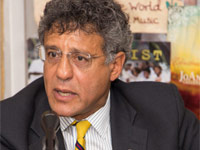 Nassau, The Bahamas – There is no compelling case for any complete overhaul of the Bahamas’ system of government and the principles that undergird it, declared Chief Justice Sir Michael Barnett.
Nassau, The Bahamas – There is no compelling case for any complete overhaul of the Bahamas’ system of government and the principles that undergird it, declared Chief Justice Sir Michael Barnett.
“Ours is a very old parliamentary democracy which has worked well,” he told Thursday’s session of the Constitution Reform Commission.
Nevertheless, he conceded, “there is no doubt that important changes can and should be made.”
Members of the Commission are Carl Bethel, Rubie Nottage, Mark Wilson, Lester Mortimer, Tara Cooper-Burnside, Michael Stevenson, Professor Dr. Lydia Saunders, Michael Albury, Chandra Sands, Brandis Duncanson, Carla Brown-Roker, Lauren Klein.
Former permanent secretary Thelma Beneby is the secretary to the Commission. She will be assisted by Annie Lloyd, Darron Henfield, Sonobia Smith, and Veronica Frazer.
In a private session with the Commission, Sir Michael discussed specific proposals for amendments to the Constitution.
The Commission has been mandated to present its recommendations for constitutional reform no later than March 31, 2013.
The Constitution which governs The Bahamas has been unchanged since coming into effect in 1973. Many of its provisions were contained by the pre-Independence constitutions.
Basic parliamentary democracy has been The Bahamas’ system of government for hundreds of years, Sir Michael pointed out.
While there have been no significant constitutional crisis in The Bahamas since Independence, there were two previous attempts at amending the constitution – in 1981 and 2002.
“In carrying out its work,” said Sir Michel, “I suggest that the Commission should be guided by a few overarching principles.
“Do these provisions strengthen our democracy, protect our citizens from abuse, and comply with our obligations as a responsible member of the international community?”
He specifically mentioned the UN Universal Declaration of Human Rights, the UN Convention on the Elimination of all forms of Discrimination against Women, and the UN Convention on the Rights of the Child.
The Chief Justice said he was “particularly pleased” there are a number of young persons on the Constitution Reform Commission.
“You were not raised in the colonial era,” he said, “and therefore bring with you a perspective not coloured by an affectionate longing to retain vestiges of the colonial past.
“I urge you also not to be afraid to be critical of some of the decisions of the founding fathers when they made the 1973 Constitution.
“I must confess that they made some decisions which still seem inexplicable.”
As many of the provisions of the Constitution cannot be amended without public approval in a referendum, he said, “you must bear in mind that any proposal for change must be able to receive wide spread public support.
“Change does not come easy. It is often disruptive and unsettling. The Commission cannot ignore that reality in making its recommendations.
“While it is an argument for caution, it is not an argument for inertia.”
By Gladstone Thurston
Bahamas Information Services



